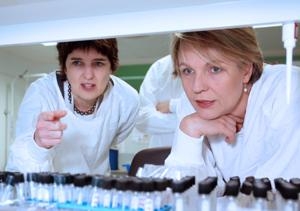UNSW receives highest medical research funding
Groundbreaking work on HIV, cardiovascular disease and improving patient safety are among the major UNSW research programs to be awarded funding by the National Health and Medical Research Council.
Groundbreaking work on HIV, cardiovascular disease and improving patient safety are among the major UNSW research programs to be awarded funding by the National Health and Medical Research Council.

Groundbreaking work on HIV, cardiovascular disease and improving patient safety in health care systems are among the major University of New South Wales research programs to be awarded funding by the National Health and Medical Research Council (NHMRC).
UNSW has been awarded more than $52 million for 15 grants, or 41 percent of the total, the best result in the country. The Federal Minster for Health, Tanya Plibersek, made the announcement today at UNSW’s Lowy Cancer Research Centre.
Significantly, UNSW received six prestigious Program Grants, awarded to the country’s “superstar” researchers, representing a 100% success rate in the funding round due to commence in 2014.
“The Gillard Government is very pleased to be supporting Australia’s best and brightest medical researchers as they undertake their vital work,” Ms Plibersek said. “Continued government investment in research enables development of effective new treatments and new policy solutions in our health system.”
UNSW Deputy Vice-Chancellor (Research) Professor Les Field, said: "This is a fantastic outcome – to be successful in so many Program Grants is yet another endorsement for the world-leading medical research underway at UNSW.”
“The Program Grants are particularly important because they provide long-term support to tackle significant research problems and they let us bring together teams of our best researchers. UNSW has been more actively fostering collaborations between our strongest research groups and this has aligned well with the aims of the NHMRC Program Grant scheme,” Professor Field said.
Professor David Cooper, from UNSW’s Kirby Institute received $12.6 million for a major research program involving seven groups in Sydney and Melbourne that will look at how HIV lies dormant in some parts of the body, evading eradication by HIV therapy, as well as how the immune system responds to the virus.
“The development of cures, vaccines and better treatments for HIV/AIDS is an urgent global health priority,” Professor Cooper said. “This research program funding will allow for design of novel vaccines and treatments, and the translation of laboratory findings into human clinical trials.”
A team led by Professor Jeffrey Braithwaite, from UNSW’s Australian Institute of Health Innovation, received $10.9 million to lead an international research team tackling the biggest risks patients face in modern health care systems like Australia’s, including medical errors, delays in treatment and sub-standard care.
“Health care errors occur because very complex systems are under stress, so we need to understand how to deliver systems-wide solutions,” Professor Braithwaite said. “We need to translate our knowledge of systematic shortfalls into much smarter health care for the benefit of all Australians,” he said.
Professor Levon Khachigian and a team from UNSW’s Vascular Research Centre, received $8.4 million for research into cardiovascular disease.
“Cardiovascular disease claims one person every 10 minutes in Australia and causes one in three deaths worldwide,” Professor Khachigian said.
“The molecular and cellular processes underlying atherosclerosis, vascular injury and thrombosis are highly complex and not well understood. A multifaceted approach is needed and this program brings together world experts to interrogate gaps in our basic understanding, and to develop novel therapies for patients.”
Professor Nicholas Buckley, from UNSW’s Prince of Wales Clinical School, received $6.8 million for an integrated research program into drug related deaths in Australia and the Asia-Pacific.
“Drug-related deaths in Australia account for 6.6% of all deaths, but not much of the data is analysed,” Professor Buckley said. “In much of the rural Asia-Pacific, pesticide poisoning and snakebite are major problems. We’ll be looking at chemical poisoning, serious adverse drug reactions, and snake and spider bite with the aim of rapidly translating findings into better treatment, regulations and policy.”
Professor Simon Gandevia and a team from UNSW and Neuroscience Research Australia, received $6.8 million to conduct clinical trials to identify optimal strategies for maximising physical functioning for people with weakness and fatigue, impaired sensation and balance, and contracture.
“Motor impairment results in physical disability in a wide range of debilitating diseases and health conditions,” Professor Gandevia said. “Our program offers great scope for improving the health and quality of life for millions of Australians and substantially reducing health care costs.”
A team led by Professor Andrew Lloyd from UNSW’s School of Medical Science and The Kirby Institute received $5.4 million for a research program investigating treatments for hepatitis C, a disease affecting a quarter of a million Australians, leading to progressive liver disease and often liver failure or cancer.
“There is no vaccine for hepatitis C and prevention programs have limited effectiveness, but new antiviral therapies now offer high rates of cure,” Professor Lloyd said. “This funding will help us to evaluate strategies to improve the health of those affected and prevent new infections by better understanding the virus and the body’s immune response.”
UNSW also received one Development Grant of $760,000 – awarded to Dr Americo Migliaccio – and eight postgraduate scholarships.
Minister Plibersek announced a total of $127.9 million in funding for 151 grants for health and medical research across Australia.
To read Professor David Cooper's speech from the event, click here.
More information: A full list of grants is available on the NHMRC website.
Media contact: Steve Offner, UNSW Media Office, 02 9385 1583 / 0424 580 208